

Crede noted that almost all prior research had only compared power poses to contractive poses like slouching but had failed to include a normal pose as a control group. The few studies that had compared a power pose to a normal pose found no effect of power poses. Power posing. Amy Cuddy demonstrating her theory of "power posing" with a photo of the comic-book superhero Wonder Woman Power posing was first suggested in a 2010 paper by Dana R.
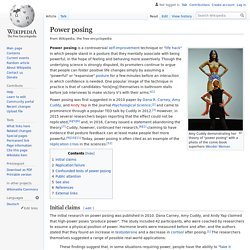
Carney, Amy Cuddy, and Andy Yap in the journal Psychological Science,[2] and came to prominence through a popular TED talk by Cuddy in 2012.[3] However, in 2015 several researchers began reporting that the effect could not be replicated,[4][5][6] and, in 2016, Carney issued a statement abandoning the theory.[7] Cuddy, however, continued her research,[8][1] claiming to have evidence that posture feedback can at least make people feel more powerful.[9][10][11] Today, power posing is often cited as an example of the replication crisis in the sciences.[12]
Your body language shapes who you are [ TED Talk : Amy Cuddy ] Amy Cuddy's Co-Author Now Says You Should Ignore her Body Language Advice. What To Do About Amy Cuddy? Oh dear, it seems we have a bit of a science mess.
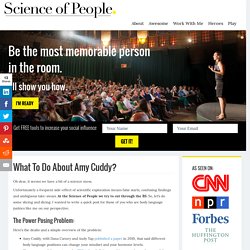
Unfortunately a frequent side-effect of scientific exploration means false starts, confusing findings and ambiguous take-aways. At the Science of People we try to cut through the BS. So, let’s do some slicing and dicing. I wanted to write a quick post for those of you who are body language junkies like me on our perspective.
The Power Posing Problem: Here’s the dealio and a simple overview of the problem: Amy Cuddy, with Dana Carney and Andy Yap published a paper in 2010, that said different body language positions can change your mindset and your hormone levels.She gave one of the most popular TED talks of all time on this research, speaks around the world about power posing and just published a recent book on it.When another research team led by Eva Ranehill attempted to replicate the study, they couldn’t. Bad news bears my friends. Small note: I have met Mrs. What’s Next? Examine the literature review in Cuddy’s studies.
Inside the debate about power posing: a Q & A with Amy Cuddy. Photo: James Duncan Davidson/TED At the TEDGlobal 2012 conference, social psychologist Amy Cuddy gave the talk “Your body language shapes who you are,” in which she detailed the effects of “power posing,” based on research by herself and other scientists working in the field.
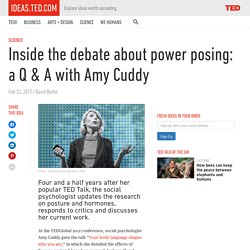
Cuddy delivered a beautiful talk that resonated with our audience and the idea went viral, going on to become one of TED’s most watched talks ever, with more than 39 million views as of February 2017. The original scientific paper and her talk inspired numerous studies and more research on the effects of posture, all part of the process of science at work. As Cuddy herself explains, this is the normal, expected progress of science — and one reason the job of a scientist is never done. Yet during this process, a debate arose in the social science community about the robustness of some of the findings on power posing. Power Posing Is Back: Amy Cuddy Successfully Refutes Criticism. In 2012, power posing was all the rage.
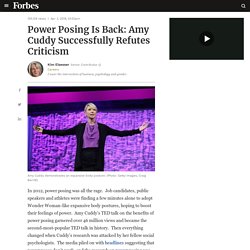
Job candidates, public speakers and athletes were finding a few minutes alone to adopt Wonder Woman-like expansive body postures, hoping to boost their feelings of power. Amy Cuddy’s TED talk on the benefits of power posing garnered over 46 million views and became the second-most-popular TED talk in history. Then everything changed when Cuddy’s research was attacked by her fellow social psychologists. The media piled on with headlines suggesting that power poses don’t work, and the research on power posing was labeled pseudoscience. Now, Cuddy and her new collaborators published a rebuttal to the naysayers suggesting power posing is still a legit method to make yourself feel more powerful. Body Language Hacks: Be Confident and Reduce Stress in 2 Minutes.
There is a simple strategy that you can use to reduce anxiety, improve your ability to deal with stress, and boost your confidence.

The best part? It works immediately and only takes two minutes to do. Here’s the deal… Your Hormones and Your Confidence Recent research coming out of Harvard University, The University of Oregon, The University of Texas and many other places is revealing that powerful and effective leaders not only share similar mindsets, but also similar hormone levels. Higher levels of testosterone (in both men and women) lead to increased feelings of confidence. Here’s what that means: if you enjoy these hormone levels, then you are biologically primed to be more assertive, confident, and relaxed.
Sounds good, right? What is particularly important about testosterone and coritsol is that your levels of each hormone can change rapidly depending on the social, physical, and environmental cues that surround you. What does this have to do with feeling more confident? The Power of Body Language to Combat Depression. You may be wondering how in the world body language helps heal the heaviness of depression.
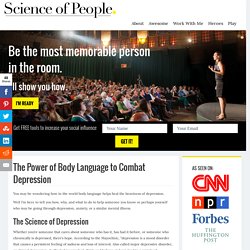
Well I’m here to tell you how, why, and what to do to help someone you know or perhaps yourself who may be going through depression, anxiety, or a similar mental illness. The Science of Depression Whether you’re someone that cares about someone who has it, has had it before, or someone who chronically is depressed, there’s hope. According to the Mayoclinic, “depression is a mood disorder that causes a persistent feeling of sadness and loss of interest.